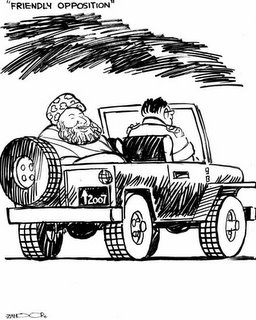
Pakistan: The Myth of An Islamic Peril
By Frederic Grare
Carnegie Endowment Policy Brief #45, February 2006
(Click the title above for complete Report)
Also See Khalid Hasan' Story below which is a good summary of the policy brief with some insightful comments.
Daily Times, February 16, 2006
No Islamist threat to Pakistan: expert
By Khalid Hasan
WASHINGTON: According to a Pakistan expert, the Islamist threat is neither as great nor as autonomous as many assume, nor do serious law-and-order problems mean that the fate of the state is at stake.
“No Islamic organisation has ever been in a position to politically or militarily challenge the role of the one and only centre of power in Pakistan: the army, argues Frederic Grare of the Carnegie Endowment for International Peace. “The possibility that violent Islamists will kill President Pervez Musharraf, throw Pakistan into turmoil, take over the country and its nuclear weapons, and escalate regional terrorism has dominated the psychological and political landscape. Such fears have usually led to support of the Pakistani military as the only institution able to contain the danger,” he writes. The Pakistani Army, he adds, has used Islamic organisations for its purposes, both at home and abroad. Islamist organisations balance the power of rival mainstream political parties, preserving the army’s role as national arbiter.
Grare, who worked as a diplomat at the French embassy in Pakistan for several years, argues that while the army’s control is solid, the situation is not without risks. Some militants have turned against the army because of Pakistan’s “betrayal” of the Taliban and cooperation with the United States in Afghanistan and in the “war on terror”. The infrastructure that supports regional sectarianism and Kashmir-Afghan jihadi activities, he points out, can be hijacked for international terrorism, as demonstrated by the July 2005 London bomb blasts. The risk of a nuclear conflict between India and Pakistan, triggered by terrorist attacks, cannot be dismissed, yet there is scant evidence that these organisations pose an uncontrollable threat.
The Carnegie expert is of the view that a Pakistan headed by an Islamist party would not necessarily be unstable. What the West perceives as a threat to the regime in Pakistan are manifestations of the Pakistani army’s tactics to maintain political control. The army uses its need for modernist order to justify its continued claim on power, he argues.
The risk of an Islamist takeover in Pakistan is a myth invented by the Pakistani military to consolidate its hold on power. In fact, religious political parties and militant organizations are manipulated by the Pakistani army to achieve its own objectives, domestically and abroad. He writes, “The army, not the Islamists, is the real source of insecurity on the subcontinent. Sustainable security and stability in the region will be achieved only through the restoration of democracy in Pakistan. The West should actively promote the demilitarisation of Pakistan’s political life through a mix of political pressure and capacity building. Enlarging the pool of elites and creating alternative centres of power will be essential for developing a working democracy in Pakistan.” He maintains that the de facto army monopoly on power is preventing the emergence of a truly democratic, economically sound Pakistan.
Grare rejects the view held by some that the army has been infiltrated by jihadi elements, arguing that although the military remains opaque, there is so far no evidence that it has been widely infiltrated, much less controlled, by the Islamists. It seems that the army reflects the society: although Islamists are undoubtedly present, there is no reason to believe that their numbers are significantly greater than in the rest of Pakistani society. Even if the top echelons of the army hierarchy were to be occupied by Islamists, it would be extremely unlikely to change the course of Pakistan’s foreign policy. Islamic parties often provide no more than an Islamic rationalisation of existing foreign policies on which a convergence of interests already exists.
“The presence of Islamic parties is a useful foil to reinforce the regime’s legitimacy abroad and to pressure secular parties domestically,” he argues. He believes that the rise of the MMA was used by the Musharraf regime to tell the United States “If you don’t listen to me and give me what I need, the mullahs will take over. And if you push me too hard to change, I will be thrown out; and then you will be sorry.”
No comments:
Post a Comment